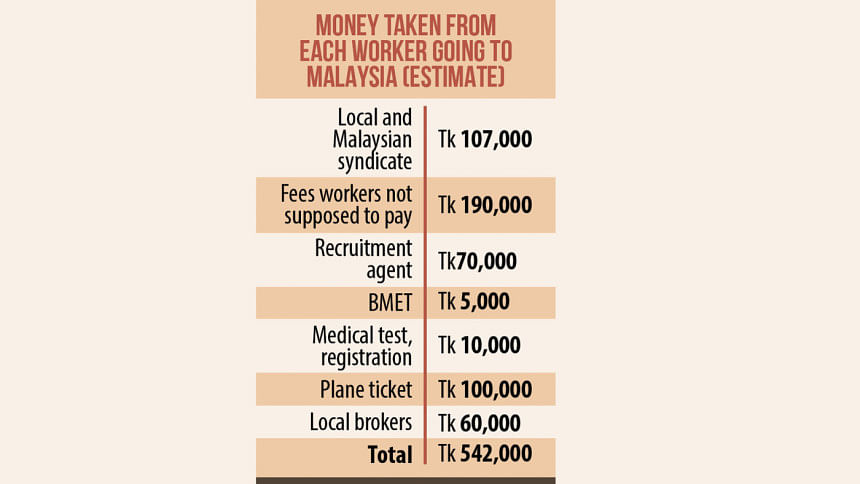Recruitment in Malaysia: Syndicate siphons over $1b out of Bangladesh

When Malaysia resumed hiring Bangladeshis in August 2022 after a four-year hiatus, governments of the two countries agreed that a worker would have to spend just Tk 78,990 to get a job in the Southeast Asian country and fly there.
But in reality, a worker had to spend Tk 5.44 lakh or $5,000, according to a survey published earlier this month by the US-based non-profit Verite.
On March 28, four UN experts wrote to the Bangladesh and Malaysia governments about the situation of Bangladeshi migrants in Malaysia and mentioned that each migrant spent between $4,500 and $6,000.
Several migrant workers who spoke to The Daily Star from Malaysia said they spent over Tk 5 lakh to get there.
On December 19, 2021, Bangladesh and Malaysia signed a memorandum of understanding, according to which, a worker would need to spend no more than Tk 78,990 for the passport, health checkup, registration, welfare, insurance, identity card, clothing, and recruitment agency fees.
Malaysian employers were supposed to pay for the plane ticket, visa, security deposit, insurance, medical test, document attestation by the Bangladesh High Commission in Kuala Lumpur, and the Malaysian recruiting agents.
Industry insiders and researchers say a syndicate of 100 Bangladeshi recruitment agents, who were selected by Malaysian authorities, created a monopoly-like situation, in which a worker had no way of getting to Malaysia without spending hefty sums.
Many believe that the leader of the syndicate is Ruhul Amin Swapan, owner of Catharsis International, in Bangladesh and Datuk Seri Mohd Amin Abdul Nor, founder of IT firm Bestinet, in Malaysia.
The latter is a Bangladesh-born Malaysian citizen whose firm operates the Malaysian government's Foreign Workers Centralised Management System (FWCMS).
There are many allegations of corruption and manipulation against his firm.
Overseas recruitment business insiders say several members of Bangladesh parliament, their relatives and political leaders are beneficiaries of the clique.
Ruhul, the owner of Catharsis, did not respond to repeated calls made by this correspondent.
The sources said a recruiting agent pays Tk 1,07,000 to the syndicate leadership for recruitment of each worker in Malaysia. The middlemen who collect job demand letters from the Malaysian employers take around Tk 1,60,000.
In recent months, the middlemen in Malaysia have been taking up to Tk 2,00,000, they said.
"Employers, certain officials of the Malaysian government and even the Bangladesh High Commission in Malaysia get a part of this money," a source in Malaysia told this correspondent.
The four UN experts in their letter also said the recruitment process of Bangladeshi workers in Malaysia reportedly begins with bribery in the human resources and home affairs ministries of Malaysia, where "fake quotas for bogus employers" are created.
On October 19 last year, Malaysian Home Minister Datuk Seri Saifuddin Nasution said "relaxing regulations on the hiring of foreign workers and the recalibration exercise" led to an excess of over 250,000 foreign workers in the manufacturing and service sectors, reported Malaysian newspaper, The Star.
A source in Malaysia said the government relaxed the approval rules for real employers, and certain companies took the chance to recruit more workers from Bangladesh than needed.
According to multiple sources and an estimate by this correspondent, Tk 2,67,000 ($2,265) [Tk 1,60,000 for Malaysian middlemen and Tk 1,07,000 paid to the syndicate leader] is laundered out of the country for each worker who gets hired in Malaysia.
From August 2022 to April this year, around 4,50,000 Bangladeshi workers migrated to Malaysia for jobs. This means the syndicate syphoned over $1 billion out of Bangladesh. "The money went mainly to Malaysia. A part of it may have been sent to some other countries," a recruiting agent said.
Migrants often don't go to licensed recruiting agents, and contact unauthorised middlemen who take Tk 50,000 to Tk 1 lakh.
Syed Saiful Haque, chairman of WARBE Development Foundation that was involved in the Verite survey, said workers who spent a lot for recruitment fees remained indebted for two to three years.
If the workers don't have jobs or remain underpaid, they go through untold sufferings, he said.
"A portion of the workers' recruitment fee is sent abroad via hundi for paying bribes in Malaysia. This is how the country loses its foreign currency," Saiful told this correspondent.
Mohammed Fakhrul Islam, joint secretary general-1 at the Bangladesh Association of International Recruiting Agencies, said Malaysia froze its recruitment in 2018 as well as this year because of the anomalies.
In 2016-18, there was a syndicate of 10 recruiting agents and this time there are 100, he said.
"Our government should act to dismantle the syndicates," he said.
Syed Saiful Haque said the Anti-Corruption Commission must investigate the allegations of corruption and money laundering by the manpower agents.
As per a previous decision, Malaysia freezes recruitment of foreign workers from tomorrow.

 For all latest news, follow The Daily Star's Google News channel.
For all latest news, follow The Daily Star's Google News channel. 




Comments